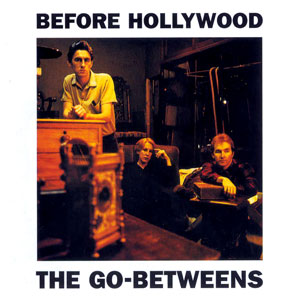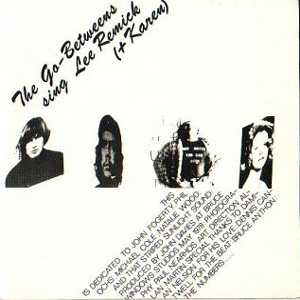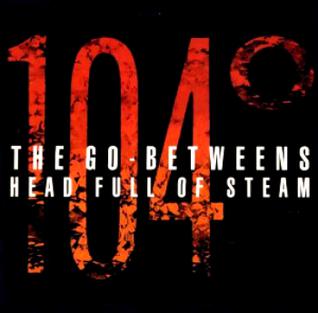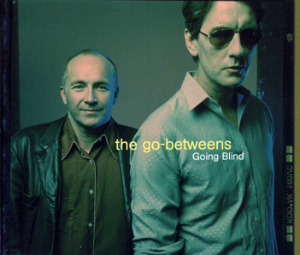
The Go-Betweens were an Australian indie rock band formed in Brisbane, Queensland, in 1977. The band was co-founded and led by singer-songwriters and guitarists Robert Forster and Grant McLennan, who were its only constant members throughout its existence. Drummer Lindy Morrison joined the band in 1980, and its lineup would later expand to include bass guitarist Robert Vickers and multi-instrumentalist Amanda Brown. Vickers was replaced by John Willsteed in 1987, and the quintet lineup remained in place until the band split two years later. Forster and McLennan reformed the band in 2000 with a new lineup that did not include any previous personnel aside from them. McLennan died on 6 May 2006 of a heart attack and the Go-Betweens disbanded again. In 2010, a toll bridge in their native Brisbane was renamed the Go Between Bridge after them.
Tuff Monks were a short-lived band consisting of Nick Cave, Mick Harvey and Rowland S. Howard with Robert Forster, Lindy Morrison and Grant McLennan. Their only release was the 1982 7" 45 rpm single "After the Fireworks", on the Australian label, Au Go Go Records. The lead track was co-written by Cave, Forster and McLennan.

Grant William McLennan was an Australian alternative rock singer-songwriter-guitarist. He co-founded the Go-Betweens with Robert Forster in Brisbane in 1977 and issued four solo albums: Watershed (1991), Fireboy (1992), Horsebreaker Star (1994) and In Your Bright Ray (1997). He collaborated with other artists on side projects. In May 2001, the Australasian Performing Right Association called his "Cattle and Cane" (1983) one of its top 30 Australian songs of all time.

Before Hollywood is the second album by Australian rock band the Go-Betweens, released in May 1983. The album reached No. 2 on the UK Independent Charts and a single, "Cattle and Cane" reached No. 4. In 2001 "Cattle and Cane" was voted as one of the 30 all-time best Australian songs in an Australasian Performing Right Association poll of 100 music industry personalities.

Spring Hill Fair is The Go-Betweens' third album, released on 27 September 1984 in the UK on Sire Records. The LP was recorded during a "very wet May" at Studio Miraval in Le Val, France. Prior to the recording of the album, bass player Robert Vickers had joined the group, enabling Grant McLennan to move to lead guitar. The original release consisted of ten songs. In 2002, Circus released an expanded CD which included a second disc of ten bonus tracks and a music video for the song, "Bachelor Kisses".

Worlds Apart is a 7" vinyl EP by the Australian indie group The Go-Betweens, released on 7 November 2005 on LO-MAX Records in the UK only. It contains a collaboration with Sushil K. Dade, "The City of Lights", which was included on his 2006 album, Secrets of the Clockhouse. "The City of Lights" was recorded in Glasgow in 2005 with Dade producing. "Finding You", "Ashes on the Lawn" and "Crystal Shacks" were recorded during the Oceans Apart sessions at the Good Luck Studios in London between November 2004 and January 2005. "Sleeping Giant", however, was recorded in Brisbane in 2004.

Robert Derwent Garth Forster is an Australian singer-songwriter, guitarist and music critic. In December 1977 he co-founded an indie rock group, The Go-Betweens, with fellow musician Grant McLennan. In 1980, Lindy Morrison joined the group on drums and backing vocals, and by 1981 Forster and Morrison were also lovers. In 1988, "Streets of Your Town", co-written by McLennan and Forster, became the band's highest-charting hit in both Australia and the United Kingdom. The follow-up single, "Was There Anything I Could Do?", was a number-16 hit on the Billboard Modern Rock Tracks chart in the United States. In December 1989, after recording six albums, The Go-Betweens disbanded. Forster and Morrison had separated as a couple earlier, and Forster began his solo music career from 1990.
"Cut It Out" is a song by the Australian alternative band The Go-Betweens that was released as the second single their fifth studio album Tallulah. It was released as a 7" and 12" vinyl single on the Beggars Banquet label in the United Kingdom on 11 May 1987, with "Time in the Desert" as the B-side.

"Cattle and Cane" is a song by the Australian alternative rock band The Go-Betweens, released as the first single from their second album Before Hollywood. It was released as a single in the United Kingdom by Rough Trade Records in February 1983 and reached No. 4 on the UK Independent Chart. The single and album were both released in Australia on Stunn, a small label allied with EMI. The Stunn pressings were of poor quality and their distribution limited.

"Bachelor Kisses" is a song by the Australian alternative rock band The Go-Betweens that was released as the second single from their third album Spring Hill Fair in 1984. The single was issued in the UK and Australia on Sire Records. "Bachelor Kisses" was the Go-Betweens' first real attempt at a commercial single.

"Lee Remick" is the debut single by Australian indie group The Go-Betweens. It was released in September 1978 by the Australian independent record label, Able Label, with only 700 copies of the 7" vinyl record produced.

"Spring Rain" is a song by the Australian alternative rock band The Go-Betweens that was released as the lead single from their fourth album Liberty Belle and the Black Diamond Express in 1986. The single was issued by Beggars Banquet in the UK and Truetone in Australia, failing to chart in the UK, but reached number 92 in Australia.

"Bye Bye Pride" is a song by Australian alternative band The Go-Betweens that first appeared on their fifth studio album Tallulah. It was released as a 7" and 12" vinyl single on the Beggars Banquet label in the United Kingdom in August 1987, with "The House That Jack Kerouac Built" as the B-side. In Australia it was released in 1987 by True Tone Records, with "Time In The Desert" as the B-Side. "Time In The Desert" was originally released as the B-side of the band's earlier single, "Cut It Out". True Tone subsequently in 1988 re-released the single with a new B-side, "The Clarke Sisters".

"Right Here" is a song by the Australian alternative band The Go-Betweens that was released as the lead single from their fifth album Tallulah. It was released as a 7" and 12" vinyl single on the Beggars Banquet label in the United Kingdom on 23 February 1987, with "When People Are Dead" as the B-side. In Australia it was released by True Tone Records, also as a 7" and 12" single. It was also released In Germany by Rebel Rec. and in the United States as a promotional single by Big Time Records.

"Head Full of Steam" is a song by the Australian alternative rock band The Go-Betweens that was released as the second single from their fourth album Liberty Belle and the Black Diamond Express. It was released as a 7" and 12" vinyl single on the Beggars Banquet label in the United Kingdom in May 1986, with "Don't Let Him Come Back" as the B-side. In Australia it was released in 1987 by True Tone Records, with "Little Joe" as the B-Side.

"Man O'Sand to Girl O'Sea" was originally released as a stand-alone single by Australian indie group The Go-Betweens. It was released as a 7" vinyl record on the Rough Trade Records label in the United Kingdom in October 1983, with "This Girl, Black Girl" as the B-side. It reached No. 24 on the UK Independent Singles Chart. Another recording of the song was included as the final track on the band's 1984 album, Spring Hill Fair.

"Part Company" is a song by the Australian alternative rock band The Go-Betweens that was released as the first single from their third album Spring Hill Fair. The single was issued in August 1984 by Sire Records with "Just a King in Mirrors" as the B-side. In the UK a 12" single was also released on Sire. The single failed to make an impact on the charts.

"Hammer the Hammer" was released as a stand-alone single by Australian indie group The Go-Betweens. It was released as a 7" vinyl record on the Missing Link Records label in Australia in June 1982 and by Rough Trade Records in the United Kingdom in July, with "By Chance" as the B-side. Forster considered that "By Chance" was a personal break-through for him. Pitchfork Media describes "By Chance" as sounding "more than a bit like the early Smiths.

"Caroline and I" is a song by the Australian indie rock band The Go-Betweens that was released as the lead single from their eighth studio album Bright Yellow Bright Orange. It was released as a promotional CD single on the Circus Records label in the United Kingdom in February 2003 and by Trifekta Records in Australia on 9 June 2003.

"Going Blind" is a song by the Australian indie rock band The Go-Betweens that was released as the lead single from their seventh album The Friends of Rachel Worth. It was released as a CD single by W. Minc Records in Australia, on the Circus Records label in the United Kingdom and Jetset Records in the United States in September 2000. "Going Blind" was The Go-Betweens' first single since "Love Goes On" in 1989.


















